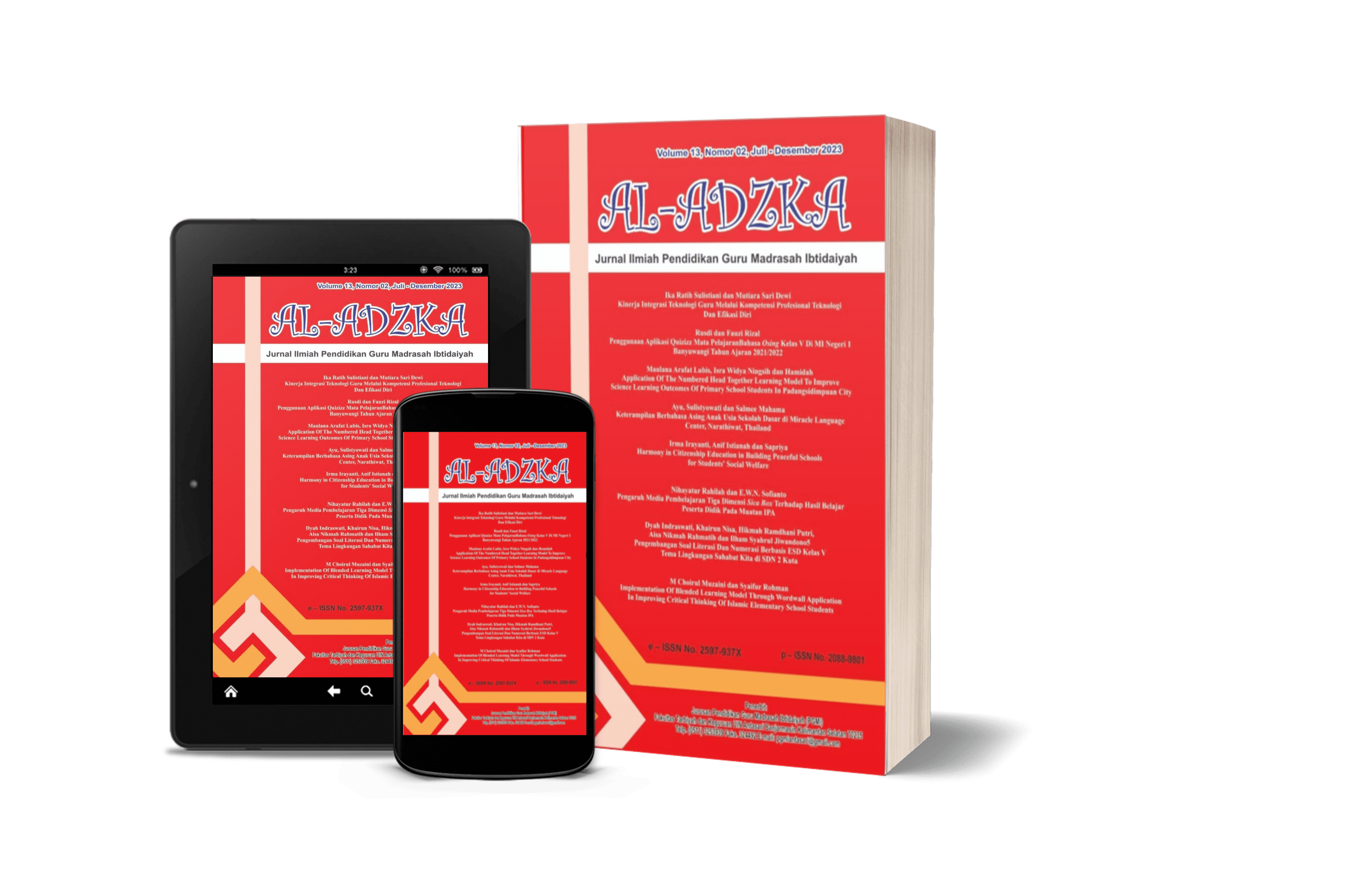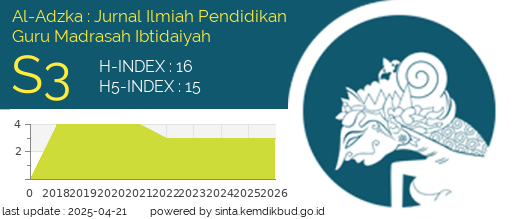Classroom Management in Creating Effective Learning in MIS Al-Ashriyah Banjarmasin
DOI:
https://doi.org/10.18592/aladzkapgmi.v11i2.4644Abstract
This study aims to describe classroom management in creating effective learning including the planning of classroom management, the implementation of classroom management, and the supervision of classroom management at MIS Al-Ashriyah. The method used in this research is descriptive qualitative, data collection using observation and interviews. The results of this study indicate that planning of classroom management is carried out by making learning implementation plans, preparing the necessary learning media, and always establishing good communication with parents and guardians of students. The implementation of management is carried out with the expertise of the teacher in the classroom, starting from the attitude of the teacher who is calm, friendly, and smiling, always greeting and greeting when entering the class. At the beginning of each lesson, always pray together and recite the Qur'an which is led directly by the teacher, then the teacher makes the class atmosphere comfortable and safe, followed by student arrangements starting from checking student attendance lists, picket class cleanliness, as well as assessing and appreciating students. Learning support facilities are also provided, such as a reading corner, the provision of plastic folders used to store a collection of assignments and grades, and a drawer where learning tools are stored, managing the implementation of learning by compiling based on student circumstances, delivering easy-to-understand material, while supervision is carried out by class teachers and principals which is carried out continuously or continuously.References
Agustya, Zeva, and Ady Soejoto. 2017. “Pengaruh Respon Siswa Tentang Proses Pembelajaran Terhadap Hasil Belajar Siswa Kelas X Pada Mata Pelajaran Ekonomi Di SMA Negeri 1 Wonoayu Kabupaten Sidoarjo.” Jurnal Pendidikan Ekonomi (JUPE) 5(3).
Aldawood, Hussain, Anwar Alhejaili, Marwa Alabadi, Olayan Alharbi, and Geoffrey Skinner. 2019. “Integrating Digital Leadership in an Educational Supervision Context: A Critical Appraisal.” Pp. 1–7 in 2019 International Conference on Engineering Applications, ICEA 2019 - Proceedings. IEEE.
Aliyyah, Rusi Rusmiati, and Universitas Djuanda. 2016. “Management of Lower Grade At Amaliah Elementary School Ciawi.” Jurnal Sosial Humaniora 7(2):81–95.
Arifin, Moch, Makherus Sholeh, Abdul Hafiz, Ririn Agustin, and Mahardika Wardana. 2021. “Developing Interactive Mobile Mathematics Inquiry to Enhance Students’ Mathematics Problem-Solving Skil.” International Journal of Interactive Mobile Technologies 15(1):24–38.
Aziz, Abdul. 2017. “Komunikasi Pendidik Dan Peserta Didik Dalam Pendidikan Islam.” Mediakita 1(2):173–84.
Bararah, Isnawardatul. 2017. “Efektifitas Perencanaan Pembelajaran Dalam Pembelajaran Pendidikan Agama Islam Di Sekolah.” Jurnal MUDARRISUNA: Media Kajian Pendidikan Agama Islam 7(1):131–47.
Biwer, Felicitas, Mirjam G. A. oud. Egbrink, Pauline Aalten, and Anique B. H. de Bruin. 2020. “Fostering Effective Learning Strategies in Higher Education – A Mixed-Methods Study.” Journal of Applied Research in Memory and Cognition 9(2):186–203.
Buchari, Agustini. 2018. “Peran Guru Dalam Pengelolaan Pembelajaran.” Jurnal Ilmiah Iqra’ 12(2):106.
Dolev, Niva, and Shosh Leshem. 2017. “Developing Emotional Intelligence Competence among Teachers.” Teacher Development 21(1):21–39.
Eliyanti, Marlina. 2016. “Pengelolaan Pembelajaran Dan Pengembangan Bahan Ajar.” Pedagogi Jurnal Penelitian Pendidikan 04(01):59–69.
Fauth, Benjamin, Jasmin Decristan, Anna Theresia Decker, Gerhard Büttner, Ilonca Hardy, Eckhard Klieme, and Mareike Kunter. 2019. “The Effects of Teacher Competence on Student Outcomes in Elementary Science Education: The Mediating Role of Teaching Quality.” Teaching and Teacher Education 86:102882.
Fikri, Ali, Aulia Rahmawati, and Nur Hidayati. 2020. “Persepsi Calon Guru Pai Terhadap Kompetensi 6C Dalam Menghadapi Era 4.0.” At-Ta’dib: Jurnal Ilmiah Prodi Pendidikan Agama Islam 12(1):89–96.
Ford, Timothy G., Mary Elizabeth Van Sickle, Lynn V. Clark, Michelle Fazio-Brunson, and Dorothy C. Schween. 2017. “Teacher Self-Efficacy, Professional Commitment, and High-Stakes Teacher Evaluation Policy in Louisiana.” Educational Policy 31(2):202–48.
Gurung, Regan A. R., and Kathleen Burns. 2019. “Putting Evidence-Based Claims to the Test: A Multi-Site Classroom Study of Retrieval Practice and Spaced Practice.” Applied Cognitive Psychology 33(5):732–43.
Hargreaves, A., and M. Fullan. 2012. Professional Capital: Transforming Teaching In Every School. New York: Teachers College Press.
Khairunnisa, and Dina Aryanti. 2018. “Penerapan Media Boneka Tangan Dalam Keterampilan Berbicara Siswa Kelas IIIb MI At-Thayyibah.” Al-Adzka: Jurnal Ilmiah Pendidikan Guru Madrasah Ibtidaiyah VIII(2):107–16.
Li, Ling, and Yan Liu. 2020. “An Integrated Model of Principal Transformational Leadership and Teacher Leadership That Is Related to Teacher Self-Efficacy and Student Academic Performance.” Asia Pacific Journal of Education 00(00):1–18.
Magdalena, Ina, Ayu Wahyuni, and Davina Dewi Hartana. 2020. “Pengelolaan Pembelajaran Daring Yang Efektif Selama Pandemi Di SDN 1 Tanah Tinggi.” Edukasi Dan Sains 2(01):366–77.
Maunah, Binti. 2019. “The Contribution of Family and Community Education in Realizing the Goals of School Education.” American Journal of Education and Learning 4(2):292–301.
Mulyono. 2012. Strategi Pembelajaran. Malang: UIN Maliki Press.
Niculescu, Maria. 2015. “The Quality of the Educational Process via Classroom Leadership.” Procedia - Social and Behavioral Sciences 180(November 2014):885–91.
Noor, Fu’ad Arif. 2019. “Pendidik Mi Di Era RevoKompetensilusi.” Elementary 7(2):251–78.
Noor, Muhammad. 2018. “Peningkatan Kinerja Guru Melalui Supervisi Edukatif Kolaboratif Secara Periodik.” Al-Adzka: Jurnal Ilmiah Pendidikan Guru Madrasah Ibtidaiyah 8(1):45–60.
Rinda, Renata Kenanga, and Nodistya Septian Indrastana. 2020. “The Crucial Elements of Classroom Management.” Journal of English in Academic Professional Communication 6(2).
Rosidah. 2018. “Strategi Pengelolaan Kelas Efektif Dan Efisien Dalam Proses Pembelajaran.” Jurnal Teknologi Pendidikan Madrasah 1(2):208–17.
Sholeh, Makherus. 2016. “Pendidikan Karakter Melalui Implementasi Budaya Religius Di Sekolah (Studi Di SD LPI Zumrotus Salamah Tulungagung).” Al-Adzka: Jurnal Ilmiah Pendidikan Guru Madrasah Ibtidaiyah 6(1):129–50.
Sholeh, Makherus, Raihanatul Jannah, Mahmudah, and Khairunnisa. 2021. “Pengembangan Model Pembelajaran Efektif Dan Bermakna Di MI Perwanida Blitar.” Muallimuna : Jurnal Madrasah Ibtidaiyah 3(2):116–27.
Supriyono. 2018. “Pentingnya Media Pembelajaran Untuk Meningkatkan Minat Belajar Siswa SD.” Edustream: Jurnal Pendidikan Dasar II(1):43–48.
Tafonao, Talizaro. 2018. “Peranan Media Pembelajaran Dalam Meningkatkan Minat Belajar Mahasiswa.” Jurnal Komunikasi Pendidikan 2(2):103.
Warsono, Sri. 2016. “Pengelolaan Kelas Dalam Meningkatkan Belajar Siswa.” Manajer Pendidikan 10(5):469–76.
Widiasworo, Erwin. 2018. Cerdas Pengelolaan Kelas. Yogyakarta: DIVA Press.
Yusuf, Bistari Basuni. 2017. “Konsep Dan Indikator Pembelajaran Efektif.” Jurnal Kajian Pembelajaran Dan Keilmuan 1(2):13–20.
Zee, M., & Koomen, H. M. Y. 2016. “Teacher Self-Efficacy and Its Effects on Classroom Processes, Student Academic Adjustment, and Teacher Well-Being: A Synthesis of 40 Years of Research.” Review of Educational Research 86:981–1015.
Downloads
Published
How to Cite
Issue
Section
License
Authors who publish with this journal agree to the following terms:
- Authors retain copyright and grant the journal right of first publication with the work simultaneously licensed under a Creative Commons Attribution 4.0 International that allows others to share the work with an acknowledgement of the work's authorship and initial publication in this journal.
- Authors are able to enter into separate, additional contractual arrangements for the non-exclusive distribution of the journal's published version of the work (e.g., post it to an institutional repository or publish it in a book), with an acknowledgement of its initial publication in this journal.
- Authors are permitted and encouraged to post their work online (e.g., in institutional repositories or on their website) prior to and during the submission process, as it can lead to productive exchanges, as well as earlier and greater citation of published work.












